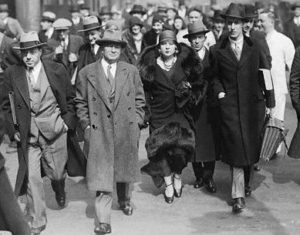Nightstick Censorship: Nathan Burkan and Mae West
The prosecution did not have the script for Mae West’s The Pleasure Man or any recording of the performance to show the jury. A mere synopsis of its plot, even a verbatim repetition of its dialogue, would not necessarily be inconsistent with Nathan Burkan’s defense theory that the play was a wholesome entertainment with a powerful moral lesson about the wages of sin. It thus fell to the police officers who saw the show to prove that, in live performance with all its attendant stage business, The Pleasure Man was a bacchanal of perversion and degeneracy. Burkan promised that “if they insist on bringing in filth, I’ll make this one of the filthiest cases ever heard.”

“The court room will be treated to unusual maneuvers on the part of big burly cops, who will be somewhat embarrassed, to say the least,” the New York Sun teased in its trial preview. Indeed, the proceeding was nothing short of Monty Python–esque. Captain James J. Coy, who had once done a bit of acting himself, carried most of the load for the prosecution. Coy (a name that might well have been bestowed on him had this been an Oscar Wilde play) had watched the opening-night performance with a police stenographer, whom he would nudge with his elbow when he wanted something taken down. He testified to about a dozen individual examples of indecency in the form of dirty dialogue and song lyrics, as well as a two-man acrobatic stunt in which a larger man (Lenzen) in baggy pants balances a smaller man (Selig) on his hands. As described in the District Attorney’s court papers, the two men tumble in a manner that allows Selig’s head and shoulders to disappear inside Lenzen’s prop trousers, bringing “Selig’s head to a point approximately where Lenzen’s private parts would be located,” with Selig “moving his head about in the vicinity of Lenzen’s private parts.” But most of all, Coy objected to the mincing, fanny-poking, whoopsing, and yoo-hooing of effeminate men in ladies’ clothing.
“Once Coy got going,” the Daily News reported, “the spectators began to wring the blushes out of their hair.” Coy whooped and snake-danced and spoke in falsetto to demonstrate for the jury what he had witnessed at the theater. His mince, in particular, delighted the courtroom spectators:
He put his left hand on his hip, and his right fingertips up to his shoulder and he walked in front of the witness chair.
“That,” he said positively, “is how they walked on the stage of this show. Very effeminate.”
In contrast, Captain Coy opined, the famous Julian Eltinge stage walk was not objectionable because he did not put his hand on his hip. Coy also found it very concerning that one of the female impersonators in the play sewed lampshades during scenes set backstage.
Coy had an unfortunate propensity for malapropisms. The prosecutors had wanted to make some hay from an exchange in which one female impersonator asks, “Did you ever have a platonic love affair?” and another responds, “Yes, but then his wife found out.” Coy testified that the phrase used was “chronic love affair,” rendering the dialogue, if not innocent, then at least incomprehensible, which was just as good for the defense.
Burkan tormented poor Coy for hours on cross-examination. “You ‘whoop’ pretty well, now let us hear you sing. Give us a couple verses of ‘I Am Queen of the Beaches’ as you heard it sung in the show.” Coy had testified that the last word of the title phrase was slurred to rhyme with “ditches,” not “peaches.” Coy demurred: “I don’t know the woids. I don’t even know the foist voise.” Coy’s memory failed him again and again when pressed for details. At length, Burkan forced him to concede that on direct examination he had not been testifying from his own memory of the show, but from his recent study of the stenographer’s notes. “Isn’t it true that your recollections [on the stand] were better than they were fifteen minutes after you saw the play?” Coy admitted that was so.
